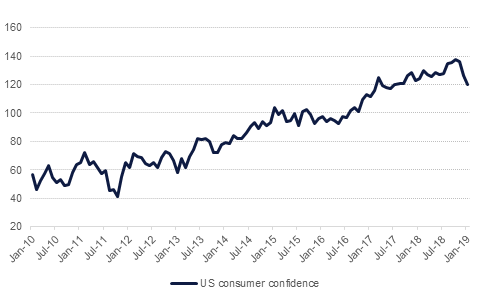
The UK parliament voted to reopen the government’s Brexit plan and send PM Theresa May back to the EU to renegotiate terms of the deal. The so-called ‘Brady amendment,’ which proposes replacing the contentious Irish backstop provision with yet to be defined ‘alternative arrangements,’ could increase support for PM May’s original plan if no new deal can be reached with the EU and the clock runs down to the March 29 deadline for the UK to leave the EU. It does, however, also increase the risk of a no-deal Brexit if the EU digs in and refuses to renegotiate, as they have announced so far, and the UK government fails to win support from hard Brexiters for the original deal. In response to the latest developments out of parliament sterling sold off, falling back to a 1.30 handle.
US consumers started the year on a weak footing as the Conference Board consumer confidence survey hit a one and a half year low. The index fell to 120.2, the lowest level since July 2017 and well off expectations. Stock market volatility in the past two months, hiring borrowing costs and the US government shutdown will all have weighed on sentiment to start the year. Sentiment on the labour market was more positive and this week’s NFP report will be tracked closely to see if December’s large job gains were carried on into the new year. The decline in the index in January represents three months in a row of falling confidence but should be borne in context of a dramatic improvement in overall levels over the past few years.
Abu Dhabi Commercial Bank, Union National Bank and Al Hilal Bank have agreed to merge. The combined entity will potentially be the Gulf’s fifth largest lender with about USD 114bn in assets. ADCB has offered 0.5966 share for every UNB share and the combined entity will buy Al Hilal Bank for about AED 1bn. The deal is expected to close in the first half of 2019 with ADCB Chairman Eissa Mohamed Al Suwaidi and ADCB CEO Alaa Eraiqat becoming the Chairman designate and CEO designate respectively of the combined entity. The new banking group will carry the ADCB identity.

Ahead of the Federal Reserve announcement later today, Treasuries continued their positive run. Gains were led by the belly of the curve. Yields on the 2y UST, 5yy UST and 10y UST closed at 2.57% (flat), 2.55% (-3 bps) and 2.71% (-3 bps).
Regional bonds remains in a tight range. The YTW on the Bloomberg Barclays GCC Credit and High Yield index remained around 4.49% while credit spreads hovered around 189 bps.
Sterling was the biggest mover overnight, declining by 0.7% as parliament voted to reopen negotiations with the EU on the terms of Brexit, specifically the Irish backstop provision. GBP has moved back to a 1.30 handle. AUD is up strongly this morning thanks to faster than expected inflation numbers in the final months of 2018 and a jump in iron ore prices.
Developed market equities closed mixed amid further signs of optimism over trade talks and mixed corporate earnings. The Euro Stoxx 50 index added +0.5% while the S&P 500 index lost -0.2%.
It was a mixed day of trading for regional equities. The Tadawul dropped -0.5% on the back of weakness in banking sector stocks. It appears to be case of investors’ locking in gains. Elsewhere, Global Telecom Holding rallied +9.9% after comments from company’s major shareholder that it is considering taking the company private.
Oil markets recovered much of Monday’s losses overnight as the impact of US sanctions on Venezuela and Saudi pledged to over-deliver on production cuts helped support prices. Brent futures pushed back up above USD 61/b to close at USD 61.32/b while WTI added 2.5% to end the day at USD 53.31/b. The API also reported a smaller than expected build in US crude stocks last week (1.1m bbl) while gasoline stocks were also estimated to have increased
Saudi Arabia will over-deliver on the production cut it agreed with OPEC in December in order to help rebalance markets and support prices. The Saudi Arabian energy minister said the kingdom would cut ‘well below’ its voluntary target. Part of the over delivery will be down to Saudi Arabia having the biggest influence in OPEC but also to make up for underperformance by other producers. Notably Russia has actually increased production from December to January, undermining the effectiveness of the broader production cuts. OPEC members will get an unanticipated boost from the US imposing sanctions on PDVSA, the Venezuelan state oil company, disrupting flows from the South American producer.